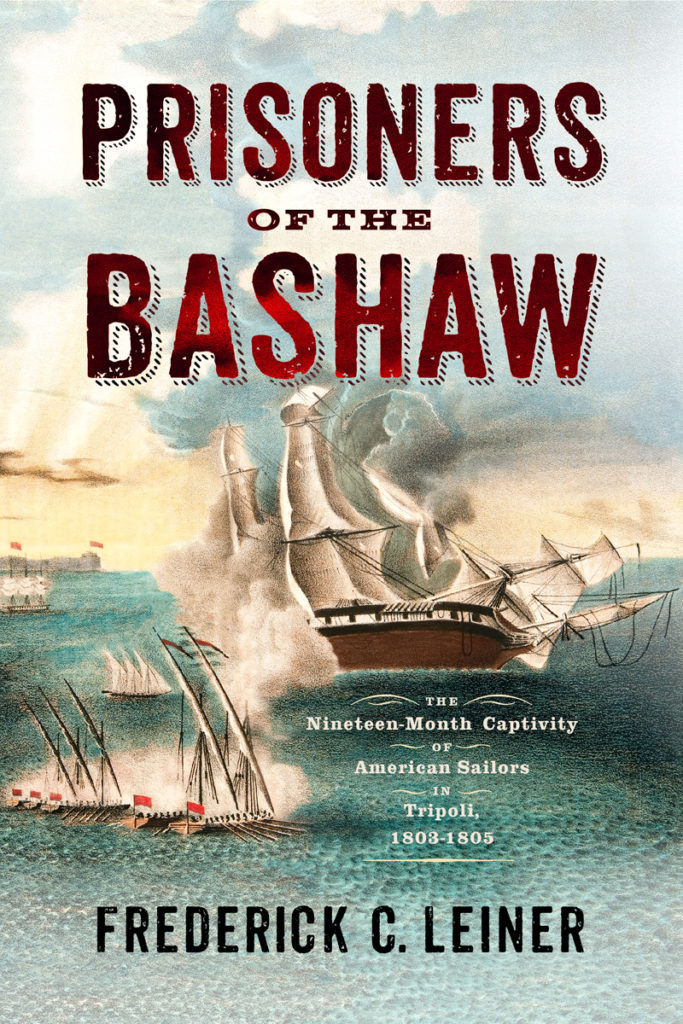

Prisoners of the Bashaw
The Nineteen-Month Captivity of American Sailors in Tripoli, 1803–1805
$35.00 Add to Cart Save 25% on every book by joining our Book Club


America’s first crisis with the Islamic world: the diplomatic and military mission to free more than three hundred enslaved sailors
On October 31, 1803, the frigate USS Philadelphia ran aground on a reef a few miles outside the harbor of Tripoli. Since April 1801, the United States had been at war with Tripoli, one of the Barbary “pirate” regimes, over the payment of annual tribute—bribes so that American merchant ships would not be seized and their crews held hostage. After hours under fire, the Philadelphia, aground and defenseless, surrendered, and 307 American sailors and marines were captured. Manhandled and stripped of their clothes and personal belongings, the men of the Philadelphia were paraded before the Bashaw of Tripoli, Yusuf Karamanali. The bashaw imprisoned the officers and forced the sailors into enslaved labor. Regularly beaten and given a meager diet, several died in captivity; escape attempts failed, while a few Americans ended up converting to Islam and joined their captors. President Thomas Jefferson, Congress, U.S. diplomats, and Commodore Edward Preble, commander of the naval squadron off Tripoli, grappled with how to safely free the American captives. The crew of the Philadelphia remained prisoners for nineteen months, until the Tripolitan War ended in June 1805.
The Philadelphia sailors became the key to negotiations to end the war; the possibility existed that if threatened too much, the Bashaw would kill the captives. Ultimately, the United States paid $60,000 to get its citizens back, and in June 1805, the survivors began their journey home. Not only did the crisis propel careers to the forefront of national identity—David Porter, Jacob Jones, Stephen Decatur—it resonated with those opposed to slavery. Combining stirring naval warfare, intricate diplomatic negotiations, the saga of surviving imprisonment, and based on extensive primary source research, Prisoners of the Bashaw: The Nineteen-Month Captivity of American Sailors in Tripoli, 1803-1805 by Frederick C. Leiner tells the complete story of America’s first great hostage crisis.
 Frederick C. Leiner, a lawyer and historian, is the author of The End of Barbary Terror: America’s 1815 War Against the Pirates of North Africa and Millions for Defense: The Subscription Warships of 1798.
Frederick C. Leiner, a lawyer and historian, is the author of The End of Barbary Terror: America’s 1815 War Against the Pirates of North Africa and Millions for Defense: The Subscription Warships of 1798.
“Superbly written and thoroughly researched . . . . [The author] gives us a thorough understanding of the war, motives, and complications for both the United States and Tripoli and the stories of the men involved. . . . Leiner is a judicious historian. . . . Prisoners of the Bashaw is a timeless story of endurance and honor, with lesson we continue to learn.”—Journal of Military History
“The capture of an American frigate off the North African coast in 1803 heralded the worst foreign crisis yet for the young republic. . . . Prisoners of the Bashaw tells the story in rich and fascinating detail.”—Wall Street Journal
“Mr. Leiner has written what is likely the ultimate story of the US frigate Philadelphia in 1803. . . . Meticulously researched and annotated, this volume reads like a novel but is, in fact, a brilliant factual reference for anyone researching that event or just wishing to learn about a particularly dismal period in American maritime history. . . . Leiner’s book, in conjunction with Garner Allen’s 1905 volume, Our Navy and the Barbary Corsairs, will give a reader the most informed and complete look at our first encounter with the denizen of the Middle East. Prisoners of the Bashawbelongs on any history bookshelf and will satisfy anyone seeking information about this important conflict.”—Sea History
“Frederick Leiner’s Prisoners of the Bashaw is more than just a fascinating account of one of our country’s first steps onto the world stage. It is also a mirror for our times: international duplicity, public rhetoric interwoven with backroom compromises, and the audacity, suffering, and sheer heroism of our navy’s first officers and sailors. Leiner combines a fine ear for the language with a cinematographer’s eye, putting his readers at the president’s table, in the bashaw’s palace, suffering in a fetid prison, and aboard the rolling deck of an American frigate. This is a terrific read.”—Tim McGrath, author of Give Me A Fast Ship: The Continental Navy and America’s Revolution at Sea
“Prisoners of the Bashaw is a superbly written, meticulously researched, thoroughly gripping account of the grounding of an American warship off Tripoli and the capture of her 307-man crew some two centuries ago—an episode that became America’s first hostage crisis. With vivid descriptions of naval warfare, hostage-taking, ransom demands, intricate diplomacy, and foreign intrigue, Frederick Leiner captures challenges that have dogged US actions overseas from the earliest years of the Republic. Prisoners of the Bashaw recounts bravery and treachery, the toils and fortitude of Americans enslaved, and the adroit international efforts (and payment) that ultimately freed the captured crew members after nineteen months of captivity. It is an absolutely first-rate read.”—General David Petraeus, US Army (Ret.), former Commander of the Surge in Iraq, US Central Command, and NATO/US Forces in Afghanistan, and former Director of the CIA